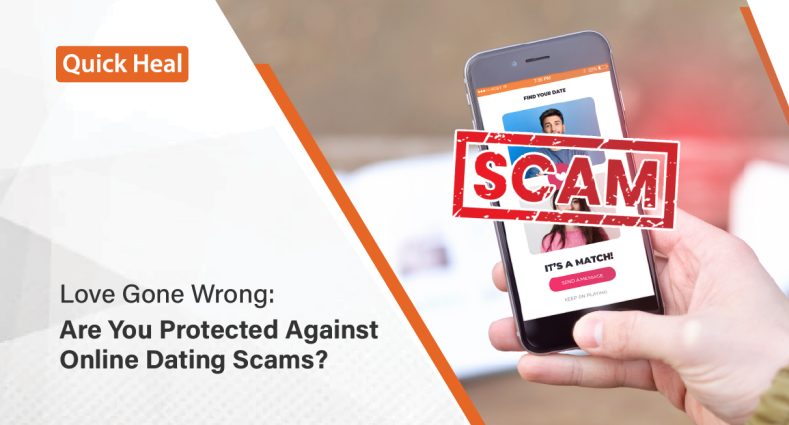Love Gone Wrong: Are You Protected Against Online Dating Scams?

Have you heard about online dating scams? In the vast digital landscape of online romance, scams are a rising concern that shadows the pursuit of love. The magnitude of people falling victim to these scams is staggering!
Consider this: In 2022, 70,000 Americans were ensnared by deceptive online romances! The financial toll was equally astonishing, with almost USD 1.3 billion lost to ruthless cyber swindlers.
The emotional toll is immeasurable, affecting victims from various demographics. From heartbroken individuals seeking genuine connections to vulnerable elderly users navigating the digital dating realm, dating scams spare no one.
What are the most common online dating scams?
Online dating scams come in various forms, but they all share a common goal: to manipulate and exploit users for financial gain. Scammers create fake profiles, often using stolen photos and fabricated backstories, to lure in potential victims. They may claim to be working overseas, in the military, or facing a personal crisis to gain sympathy and trust. Once a connection is established, the scammer will attempt to move the conversation off the dating platform and request money for various reasons.
Dating scams wear various disguises, each with its own playbook. Understanding the different scams and their methods is crucial to staying vigilant. Let’s delve into some common scams and how to spot them:
Military Romance Scams: Exploiting individuals’ emotions by impersonating military personnel, and creating fake stories to gain trust and financial support.
Intimate Activity Scams: Using intimate photos or videos obtained consensually or through hacking, threatening to expose or share them unless a ransom is paid.
Fake Dating Sites: Setting up fraudulent dating platforms to lure unsuspecting users into providing personal information or making payments for nonexistent services.
Code Verification Scams: Convincing victims to enter codes sent to their phones, which are verification codes for financial transactions on their behalf.
Malware Scams: Distributing malicious software through seemingly harmless downloads or links, compromising personal information on the victim’s device.
Photo Scams: Stealing and misusing someone else’s photos, creating fake profiles to establish deceptive relationships with unsuspecting individuals.
Crypto Romance Scam That Left a Tech Pro Heartbroken
A tech professional in Philadelphia fell victim to a cryptocurrency love scam orchestrated by a self-proclaimed “wine trader” she met on a dating app. The scam involved digitally manipulated deepfake videos, simulated affection, and promises of high returns on crypto investments. Despite initial profits and convincing gestures like receiving flowers on Valentine’s Day, she lost $450,000 when the app demanded a fake “tax,” leaving her devastated and unable to recover her money.
Online dating scam variations
There are several types of dating scams that users should be aware of:
Fake dating sites: Scammers create fraudulent dating websites to collect personal information and money from unsuspecting users.
Catfishing: Scammers use fake identities and photos to deceive users into believing they are someone else, often leading to emotional manipulation and financial fraud.
Romance scammer WhatsApp: Scammers move conversations to WhatsApp to avoid detection and request money through the messaging app.
Crypto romance scam: Scammers convince victims to invest in fraudulent cryptocurrency schemes, promising high returns and romantic involvement.
Online dating verification scams: Scammers pose as dating site employees and request personal information or money for supposed verification purposes.
Online dating security ID scams: Scammers claim that a security ID or background check is required, asking for sensitive information or payment.
Scammers employ various tactics to exploit users, such as professing love quickly, requesting intimate photos or videos, and using emotional manipulation to maintain control. They may also attempt to isolate victims from friends and family, making it harder for them to seek help or realize they are being scammed.
How to Spot Dating Scams?
Here are a few ways you can spot and avoid dating scams:
Too Good to Be True: Be cautious if the person seems too perfect or their story is overly dramatic.
Requests for Money: Avoid individuals who quickly request financial assistance or claim to be in urgent need.
Inconsistent Stories: Pay attention to inconsistencies in their background, life details, or the progression of their narrative.
Unrealistic Photos: Use reverse image searches to verify the authenticity of the photos provided.
Refusal of Video Calls: Be wary if the person avoids video calls, as scammers often use pre-recorded videos or refuse face-to-face interaction.
Too Fast Progression: Be cautious if the relationship escalates too quickly, as scammers aim to build trust rapidly.
Pressure for Personal Information: Avoid sharing sensitive information too soon, as scammers often seek personal details for malicious purposes.
Research Dating Platforms: Verify the legitimacy of dating sites by checking reviews and testimonials, and ensuring secure payment methods.
Consult Friends or Family: Seek advice from friends or family members who can provide an objective perspective on the situation.
Online Dating Safety Tips: How to stay safe from fraudsters
In the treacherous landscape of online romance scams, safeguarding your heart and wallet is paramount. Here’s how you can stay safe digitally:
Identifying Red Flags: Be wary of overly perfect profiles, rapid professions of love, or requests for money. Quick Heal Total Security offers real-time threat intelligence, helping you stay one step ahead of evolving scams.
Verifying Identities: Quick Heal’s robust firewall and identity protection features act as a digital bouncer, ensuring only genuine connections gain access to your heart and personal information.
Guarding Your Personal Information: Never share sensitive information hastily. Quick Heal’s malware protection acts as a digital shield, blocking phishing attempts and ensuring your details remain confidential.
Fortifying Your Conversations: Utilize secure communication platforms; Quick Heal ensures your messages remain encrypted. End-to-end protection protects your conversations from prying eyes and potential scammers.
Keeping Your Digital Space Clean: Just as you’d visit a doctor for regular check-ups, your digital devices need the same attention. Quick Heal’s proactive scans and system optimization tools ensure your devices are in peak condition, creating an impenetrable fortress against cyber threats.
Updating Your Software: Outdated software is a vulnerability waiting to be exploited. Quick Heal’s antivirus software simplifies the process with automatic updates, ensuring that your defenses are always up-to-date.
Doubling Up Your Defense: Quick Heal Total Security enhances your system’s defenses by providing additional layers of protection, making it significantly tougher for scammers to breach your accounts.
Reporting Suspicious Activity: If something feels off, don’t hesitate to report it. Quick Heal antivirus encourages a community approach to cybersecurity, where users actively contribute to a safer online environment.
How to report a Dating Scammer
If you suspect you’ve encountered a dating scammer, it’s essential to report them to prevent further fraud. Here are the steps you can take:
Report the scammer’s profile to the dating app or website. Most platforms have a reporting feature that allows you to flag suspicious activity.
File a complaint with the Federal Trade Commission (FTC) at ReportFraud.ftc.gov. The FTC collects information on dating website scams and other fraudulent activities.
Contact your local law enforcement agency, especially if you have lost money or shared sensitive information with the scammer.
Inform your bank or credit card company if you have sent money to the scammer. They may be able to reverse the transaction or provide guidance on preventing further losses.
Remember, reporting a scammer is crucial in protecting yourself and others from falling victim to dating app scams. By speaking up, you can help raise awareness and prevent scammers from exploiting more people in the future.
To Wrap Up
Navigating the world of online dating can be challenging, especially with the prevalence of romance scamming and other fraudulent activities. By staying informed about common tinder scams, hinge scams, and other dating scams online, you can better protect yourself from becoming a victim.
If you find yourself unsure about the answers to various questions related to online dating scams, don’t worry! Quick Heal Total Security can serve as your digital guardian, providing robust defense against online threats. With features like real-time protection, a powerful firewall, malware defense, and identity protection, Quick Heal ensures you are well-protected in your quest for safe online romance. Make Quick Heal your trusted ally and enjoy peace of mind while navigating the world of online dating.



No Comments, Be The First!